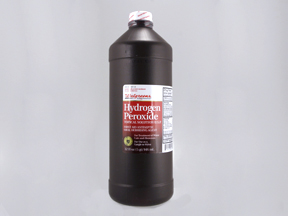
Hydrogen Peroxide Coupons & Savings Card – Discount Prices from $7.50
Generic for: Peroxyl spot treatment, Hm hydrogen peroxide, Sm hydrogen peroxide
My prescription
Edit
1ML of 3%, Hydrogen Peroxide (1 Bottle)
Select pharmacy

Albertsons
$7.50
COUPON PRICE
Walgreens
$9.00
COUPON PRICEHydrogen Peroxide savings card
Show this card to your pharmacist
Albertsons
$7.50
BIN
ID
PCN
GRP
019876
LHB738E57D
CHIPPO
LHX
Powered by
Price history for Peroxyl (brand) & Hydrogen Peroxide (generic)
1 Bottle, 1ML of 3%
Average retail price for Peroxyl
Average retail price for Hydrogen Peroxide
Average SaveHealth price for Hydrogen Peroxide
Our price history data is based on aggregated prescription data collected from participating pharmacies in America. Our prescription data updates daily to reflect the latest price changes. If you notice a missing data point, it means there wasn't sufficient data available to generate a monetary value for that date.
We analyzed Hydrogen Peroxide prices for (1ML of 3%, 1 Bottle) over the last 12 months. The average retail price was $3.64, while the average price using the SaveHealth discount card was $1.36. That's a savings of approximately 62.64% when using our Hydrogen Peroxide coupon.
Compared to the generic version, Peroxyl had an average price of $19.96 over the same time period. With the SaveHealth savings card, Hydrogen Peroxide is 93.19% cheaper on average than Peroxyl.
*Retail prices are based on pharmacy claims data, and may not be accurate when we don't have enough claims.
Hydrogen Peroxide dosage forms
Dosage Quantity Price from Per unit 1ML of 3% 1 Bottle $7.50 $7.50 1ML of 3% 2 Bottles $7.50 $3.75 1ML of 3% 3 Bottles $7.50 $2.50 1ML of 30% 1 Bottle $1.01 $1.01 1ML of 30% 2 Bottles $1.01 $0.51 1ML of 30% 3 Bottles $1.01 $0.34
| Dosage | Quantity | Price from | Per unit |
|---|---|---|---|
| 1ML of 3% | 1 Bottle | $7.50 | $7.50 |
| 1ML of 3% | 2 Bottles | $7.50 | $3.75 |
| 1ML of 3% | 3 Bottles | $7.50 | $2.50 |
| 1ML of 30% | 1 Bottle | $1.01 | $1.01 |
| 1ML of 30% | 2 Bottles | $1.01 | $0.51 |
| 1ML of 30% | 3 Bottles | $1.01 | $0.34 |
